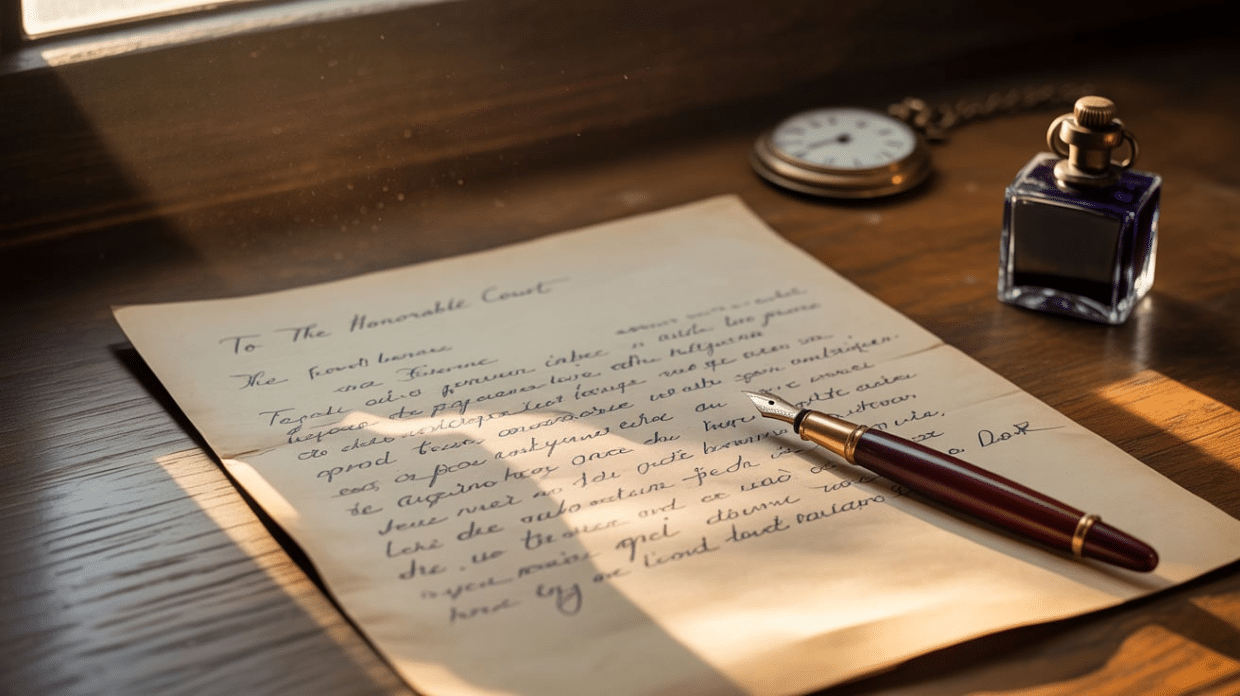Writing a personal support letter can be a powerful way to show your support for someone close to you, especially in legal matters.
But if you’re not careful, it’s easy to make mistakes that could weaken your message.
Whether you’re supporting a friend’s marriage or another important decision, your letter needs to be clear, genuine, and sincere.
In this blog, we will go over the key elements to include in a personal support letter, common mistakes to avoid, and tips on how to maintain a warm and supportive tone.
By the end, you’ll know exactly how to write a letter that truly reflects your support.
Key Elements to Include in a Personal Support Letter
When writing a personal support letter, it’s important to include key details that explain your relationship and the support you offer.
This helps paint a clear picture for the reader. Let’s go over the main points to include.
- Your Relationship with the Person: Start by explaining how you know the person and the nature of your relationship. This shows your connection to them.
- How Long You’ve Known Each Other: Mention how long you’ve known the person to add context to your support. This helps establish your credibility in their life.
- Specific Examples of Support or Impact: Provide real-life examples of how you’ve supported the person or how they’ve impacted your life. This adds depth to your letter.
- Your Views on Their Character and Integrity: Share your honest thoughts on the person’s character. This highlights their integrity and why they are deserving of support.
- Why You Support Their Decisions or Situation: Explain why you believe in their choices or situation. This will strengthen your letter and show that your support is based on trust and understanding.
How to Maintain a Warm, Supportive Tone
When writing a personal support letter, it’s important to strike the right balance between warmth and professionalism.
Use friendly, encouraging words while keeping a respectful tone. Avoid overly formal language that could feel distant.
Choose words that express care and understanding, making the reader feel the genuine support you offer.
At the same time, ensure your language remains clear and sincere. Offering specific examples of your support can make your tone even more personal.
Keep the letter positive, but stay genuine to your feelings. Avoid exaggeration, as honesty is key to creating a meaningful connection.
Steps to Write a Personal Support Letter
Writing a personal support letter is a way to show your care and encouragement.
It’s important to start with a warm greeting, share your connection, and end with words that offer reassurance. Follow these steps to create a heartfelt and supportive message.
Step 1: Greeting and Introducing Yourself
Begin with a friendly greeting, addressing the recipient by name. Introduce yourself clearly, mentioning how you know the person and why you’re writing.
This sets a personal tone and establishes the purpose of your letter.
Step 2: Describing Your Relationship and Support
Talk about your relationship with the person, including how long you’ve known them.
Mention specific examples of how you’ve supported them or witnessed their growth. This builds a strong foundation for your support.
Step 3: Concluding the Letter with Encouragement and Affection
Finish your letter by offering words of encouragement. Express your belief in their abilities and decisions.
Let them know you’re there for them, reinforcing your support with a heartfelt and caring tone.
Sample of Letter to Support Genuine Relationship from Friends
Here are a few sample personal support letters that you can use as references when writing your own.
These samples are meant to guide you in clearly and respectfully expressing your genuine support for a friend’s relationship with their spouse. Feel free to adapt them based on your specific situation.
Sample 1
Dear [Recipient’s Name],
I hope this letter finds you well. My name is [Your Name], and I have been a close friend of [Friend’s Name] for [X years]. I am writing this letter in full support of [Friend’s Name] and their relationship with their spouse, [Spouse’s Name].
Having known [Friend’s Name] for many years, I can confidently say that their relationship with [Spouse’s Name] is built on love, respect, and mutual support. I’ve had the privilege of witnessing their bond grow stronger over time, and I can see how much they genuinely care for one another.
As a friend, I have seen how [Friend’s Name] and [Spouse’s Name] have worked together to build a healthy, supportive life. They are a true partnership, always looking out for each other and making thoughtful decisions together. I have no doubt that their relationship is strong and enduring.
I fully support [Friend’s Name] and [Spouse’s Name] and their commitment to each other. Please don’t hesitate to contact me if you need any further information.
Sincerely,
[Your Name]
Sample 2
Dear [Recipient’s Name],
I am [Your Name], and I have been a friend of [Friend’s Name] for [X years]. I am writing to offer my support for [Friend’s Name] and their marriage to [Spouse’s Name], as part of the legal process they are currently involved in.
Over the years, I have had the privilege of spending time with both [Friend’s Name] and [Spouse’s Name], and I can honestly say their relationship is one based on genuine love and trust. I have seen them face challenges together and come through stronger each time, always putting each other first.
It’s clear to me that their relationship is not only real but also one built on mutual respect and shared values. I am confident that they are committed to each other and their future together.
Please feel free to reach out if you need further information. I am happy to assist in any way I can.
Best regards,
[Your Name]
Certainly! Below are new samples with a different flow to the letter, focusing on support for a friend’s relationship with their spouse for legal matters.
Sample 3
Dear [Recipient’s Name],
I hope this letter finds you well. My name is [Your Name], and I’ve had the privilege of being a close friend to [Friend’s Name] for over [X years]. I’m writing to express my strong support for [Friend’s Name] and their marriage to [Spouse’s Name].
Throughout the years, I have seen firsthand the way they work together as a couple. Their relationship is built on a foundation of mutual respect, honesty, and care for one another. From the early days of their marriage to today, I have watched their bond deepen, showing unwavering commitment even during difficult times.
What stands out most to me is their ability to support each other unconditionally. I have no doubt that their relationship is authentic, genuine, and worth supporting. I truly believe in their partnership, and I am confident in their future together.
Should you need any further clarification or details, please feel free to reach out.
Warm regards,
[Your Name]
Sample 4
Dear [Recipient’s Name],
I am writing this letter to offer my full support for the relationship between my dear friend, [Friend’s Name], and their spouse, [Spouse’s Name]. My name is [Your Name], and I’ve known [Friend’s Name] for [X years], and I have had the honor of witnessing their marriage firsthand.
I’ve always admired the respect and love [Friend’s Name] and [Spouse’s Name] share. They complement each other perfectly, always supporting one another through thick and thin. I have seen them face both challenges and joys together, and it’s clear to me that their bond is one based on trust and genuine affection.
Their commitment to each other is real, and I wholeheartedly believe they are in this relationship for the long term. I’m more than happy to stand behind them and offer my support in any way that I can.
Please don’t hesitate to contact me if further information is needed.
Sincerely,
[Your Name]
Sample 5
Dear [Recipient’s Name],
I am [Your Name], and I’ve been a close friend of [Friend’s Name] for over [X years]. I’m writing to show my support for their relationship with [Spouse’s Name] as part of a legal matter they are currently addressing.
During the time I’ve known [Friend’s Name], I’ve had the chance to observe their relationship with [Spouse’s Name] from a close distance. It’s evident that their connection is built on trust, mutual respect, and shared values. I’ve seen how they handle both the highs and lows of life, always coming together to face challenges as a team.
The strength of their relationship is something I fully support, and I have no doubt that they are deeply committed to one another. I am proud to stand behind them and offer my support in this matter.
If you need any further details or have additional questions, feel free to reach out.
Best regards,
[Your Name]
Sample 6
Dear [Recipient’s Name],
I’m [Your Name], a long-time friend of [Friend’s Name], and I’m writing this letter to provide my full support for their marriage to [Spouse’s Name]. I’ve known them both for [X years], and I’ve had the pleasure of witnessing their loving and supportive partnership.
It’s clear to me that [Friend’s Name] and [Spouse’s Name] share a relationship grounded in deep respect and care for one another. Over the years, I’ve watched them face challenges together, and I’ve seen their bond grow stronger with each passing day. Their commitment to each other is genuine, and their support for one another is unwavering.
I wholeheartedly support their relationship and the decisions they’ve made as a couple. Please feel free to contact me if you need any additional information.
Sincerely,
[Your Name]
Common Mistakes to Avoid
Avoiding common mistakes when writing a personal support letter is crucial. It helps ensure that your message is clear, genuine, and effective.
A well-written letter strengthens your support and provides a compelling argument for your friend’s relationship.
Here are some key mistakes to watch out for:
- Being Too Vague: Ensure that your letter is specific and provides clear details about your relationship and support.
- Failing to Personalize the Letter: Avoid generic statements. Tailor the content to reflect your unique relationship with the person.
- Using an Overly Formal or Detached Tone: A formal or distant tone can make your letter feel impersonal. Aim for warmth and sincerity.
- Overloading with Compliments without Substance: Compliments are great, but they should be backed by real examples or experiences that support your claims.
- Neglecting the Closing: Don’t forget to end your letter with a strong, encouraging closing that reinforces your support.
Conclusion
Writing a personal support letter can make a big difference in showing your care and commitment to someone you believe in.
Your letter can effectively express your support by focusing on sincerity, avoiding common mistakes, and adding personal touches.
Remember, the goal is to create a genuine connection with the reader. Take your time, be honest, and don’t be afraid to reach out if you need more guidance.
The effort you put into writing will surely be appreciated and can have a meaningful impact.
Start crafting your letter today, and offer the support that matters most!
Frequently Asked Questions
What is a character support letter?
A character support letter is written to vouch for a defendant’s character in a criminal case, potentially influencing the court’s decision on sentencing.
What makes a supporting character?
Support characters add depth and dimension to a story, assisting the protagonist or occasionally opposing them.







